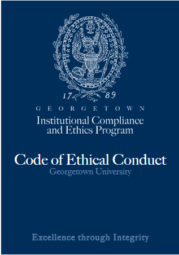Distance Education
Information for Distance Education Students
Georgetown provides the following information to students from states outside the District of Columbia enrolled in online programs.
All academic-related grievances by students (such as grade appeals) can be addressed through the Academic Affairs offices of respective schools. These offices advise students regarding academic-related grievances and guide students to appropriate University offices and resources for other types of concerns. As per University policy, those who file good faith grievances or reports of problems will not be subject to retaliatory action.
Student grievance processes are outlined in the respective school bulletins and handbooks:
- Graduate School of Arts & Sciences: Graduate Bulletin
- Law Center: Georgetown Law Bulletin
- School of Continuing Studies: School of Continuing Studies Student Handbooks
The University provides various other mechanisms for students to raise concerns or questions, including Georgetown’s Compliance Helpline.
Students enrolled in online programs may also contact their respective state department/agency for complaints about the University. State-specific contact information is listed here.
In accordance with SARA (State Authorization Reciprocity Agreements, which Georgetown operates under) requirements, complaints should first be registered with Georgetown and go through our procedures. If the person raising a complaint is not satisfied with the outcome of Georgetown’s institutional processes, the complaint (except for those that relate to student grades or student conduct violations) may be appealed to the SARA portal entity of an institution’s state. Georgetown’s SARA portal entity is:
Higher Education Licensure Commission (HELC)
Office of the State Superintendent of Education
1050 First Street, NE – 5th Floor
Washington, DC 20002
You may submit a complaint to the HELC at:
https://helc.osse.dc.gov/topic/helcadmin/community-stakeholders/public-complaints
Visit your school’s website for specific information on whether a program is offered in your state and any program-specific policies or information.
- Biomedical Graduate Education
- Georgetown Law Online Graduate Degree Programs
- McDonough Executive Education
- School of Continuing Studies
- School of Nursing & Health Studies
Additional Information for Maryland Distance Education Students
Residents of Maryland click please refer to Maryland State Distance Education Disclosures.
Additional Information for International Distance Education Students
Georgetown University may not be able to accept online students from certain international countries. In addition, while degrees conferred by Georgetown University are recognized in the United States, they may not be recognized in other countries. International students are encouraged to research the policies pertaining to degree recognition in their home country, and to contact the program-specific administrator at Georgetown for additional information prior to enrolling in a Georgetown distance education program.
Student Identity Verification Process for Distance Courses
Georgetown University employs the following measures to help ensure that the identity of students who are admitted and enroll in distance courses or programs are the same students who participate in and complete those courses or programs for academic credit. Distance courses can be either online-only or hybrid.
NetID Process
Upon admission, all students are issued a unique, official Georgetown NetID for secure access to University systems, to register for courses, and to submit academic work via LMS systems like Blackboard. As part of this set-up, the NetID system requires students to create a strong password with the following characteristics:
- Be at least eight characters in length
- Contain at least one uppercase or lowercase alphabetic character
- Contain at least one number
- Contain at least one punctuation or symbol character
- (! @ # $ % ^ & * ( ) _ + | ~ – = \ ` { } [ ] : ” ; ‘ < > ? , . / , etc.)
- Not be derived from a dictionary word or simple pattern such as abcdefgh
GOCard Process for Students in Online-Only Programs
After students in online-only programs have been issued their NetID, they secure their Georgetown One Card (GOCard) by completing the steps outlined for Online Program Participants, including completion of the “ID Verification Form.” This form requires students to supply an official, photo ID (i.e., Driver’s License; Passport; Military ID) to a notary public. Students return the notarized form to the GOCard Office and submit a photo for their GOCard by following University photo guidelines). The digitized photo is used on the GOCard and uploaded into the student information system used by faculty and staff.
GOCard Process for Students in Hybrid Programs
Hybrid programs include online coursework but also have a required place-based experience that may include coming to campus for orientation and some class sessions or specific courses.
Hybrid programs include online coursework but also have a required place-based experience that may include coming to campus for orientation and some class sessions or specific courses.
After students in these programs are issued their NetID, they gain access to the learning management system for that program. Within this system, students are required to complete Orientation including the GOCard module in which they are required to provide a photo (following the University photo guidelines) as well as a color copy of an official government-issued photo ID with an address that matches the address in the student’s University record.
Students in hybrid programs receive their GOCards during registration at their first visit to the University’s campus as part of the program. Students are required to present their official government-issued photo ID to verify identity with program staff. GOCards are not released to students for whom identity cannot be verified.
Fees
There are currently no additional student fees associated with student identity verification. In the event that any fee is needed in the future, it would be reviewed and approved by the Georgetown Board of Directors and posted with all other fees to provide advance notice to students.
Code of Ethical Conduct


